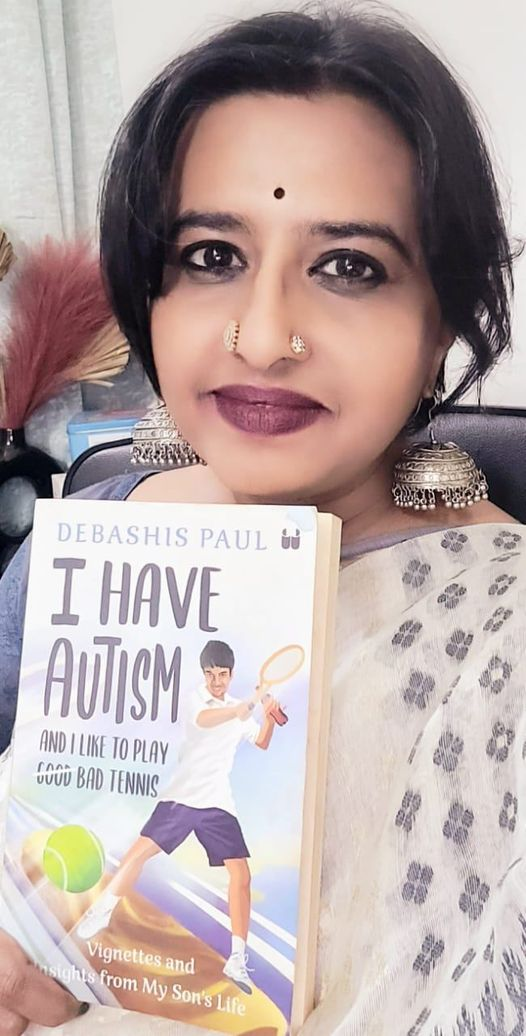septemeber musings day30 .
September 30, 2024

Wanted to mark the end of my fav month on a special note. What better than the long pending
#BOOKREVIEW "I HAVE AUTISM AND I LIKE TO PLAY BAD TENNIS" by Debashis Paul
========================
So, I was one of those people lurking on Debashis Paul’s profile, eagerly waiting for him to write a book. His quirky chats with his son, Noel, were like little pearls of insight. I mean, they always made you smile but also had you thinking. So when he finally announced his book I Have Autism and I Like to Play Bad Tennis, I immediately clicked "buy." No hesitation. But weirdly, once the book was in my hands, I couldn't bring myself to open it. Like, not even the preface. Every time I looked at it, I found myself dodging it, and I couldn’t figure out why.
The launch happened, people raved about it, but the book just sat there on my shelf, untouched. It wasn’t until Debashis nudged me for a review that I decided to face it. You see, the thing that held me back was Chapter 16: "Noel, Goodbye." I didn’t want to read that chapter. I didn’t want to say goodbye to Noel. I realized I was avoiding my own grief and the family's. How could my sadness even compare to what they went through? And yet, I couldn’t shake the feeling that once I read it, something would break inside me.
So, I did what Noel himself would probably have done I started reading the book backward. I began with the last chapter, the very one I dreaded, and then flipped to the postscript. And that’s when I realized something. Noel, through Debashis's words, was teaching me to see things differently, even to experience grief in a different way. The reverse reading wasn’t just a quirky approach; it became symbolic of Noel's unique way of understanding the world.
One of my favourite chapters was ‘Noel Lighting Up Facebook’. Noel didn’t just light up a screen with the most unaffected smile ; he lit up the hearts of everyone who read those posts. His dad captures these moments with a head full of logic and a heart full of empathy. The thing about Noel is, what seemed illogical to us made perfect sense to him, and when you read about it, you’re like, “Of course it does!” The book challenges your idea of what’s logical and what’s not, and in doing so, it forces you to reconsider your own perceptions.
And just like how Noel loved to play tennis, it didn’t bother him if we labelled his tennis as "good" or "bad." How did he infer that one gets the label of being "bad" at something? When we don’t beat others down at what we do, what we call "winning", or when we don’t impress others, or when we don’t fit the norm of how something is to be done as decided by the majority. Doesn’t it feel ridiculous, when you really think about it, how and who came up with these judgments?
Thank you, Noel, and thanks to your dad for writing it all out so powerfully. I'm going to give reading a shot. You see, I’ve never read a book entirely because I always felt that one can only be a good reader if we read “age-appropriate” books. And if I loved Tinkle or Suppandi at 50, I’m probably a bad reader, or it’s seen as a deficit in me according to the "norm." But like Noel, if I don’t see it as a deficit and I truly enjoy what I read, why not? From today on, I’m going to read what I like, how I like, and when I like!
This book is one with a head, a heart, and a soul. The head part? It’s logical but in a way that makes you question everything you thought you knew about logic. The heart? Oh, it’s everywhere. There’s no blame, no shame, no "woe is me." It’s pure empathy. As someone who’s worked with families figuring out autism, I’ve seen so many versions of these stories. But Debashis doesn’t place blame or highlight the struggles in a way that makes you pity them. Instead, you feel this profound respect for how Noel navigated the world and how his family supported him.
The soul? That’s Noel. He was a gentle warrior, fighting battles in a way that most of us wouldn’t understand. He constantly gave glimpses of what it means to be truly authentic in a world that values conformity over individuality. Every time I read a chapter, I found myself wondering: Are we, the so-called “neurotypicals,” losing our way by losing our heart? Noel never lost his. And even when the world around him was harsh or confusing, he kept that light burning.
This book doesn’t follow the rules, just like Noel. So why should I? I skipped around, reading chapters out of order. It’s not just a book for families trying to understand autism; it’s a treasure trove of insights for anyone, full of practical suggestions, trial-and-error moments, and yes, some heartbreaking truths. But it’s also full of triumphs.
Debashis, you’ve written something incredibly brave. You’ve allowed us to walk a little in Noel’s shoes, and in doing so, you’ve opened up our hearts. I’ll keep revisiting these pages, even if it leaves me feeling a little heavy each time. Because in the end, this isn’t just a book about autism or Noel or even fatherhood. It’s a book about being human and every human being will benefit reading this.
Take a bow, Debashis. And thank you for nudging me to read it. I’ll be reading it again. To this gentle warrior, I hope you are resting in peace, watching all of us down here striving to be “good.”
